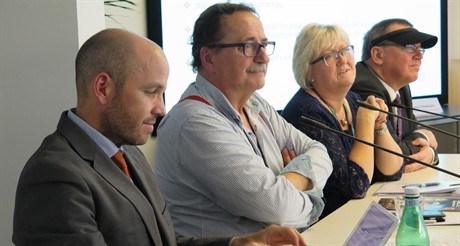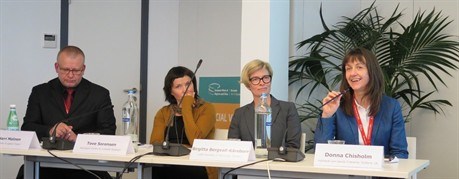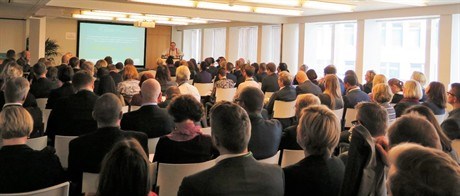Successful seminar during the European Week of Regions and Cities
The NSPA network hosted a workshop that aimed to discuss the potential for the sustainable innovation in less-urban areas in the north of Europe.
Renaissance for Remote Rurban Regions - the Case of Less-Urban Areas in the North
In a Regional Partnership with the Highlands and Islands of Scotland and Scotland Europa, the Northern Sparsely Populated Area (NSPA) hosted a seminar and debate as part of the European Week of Regions and Cities (EWRC), in Scotland House on 11th October 2016.

The topic of the seminar was sustainable innovation in less-urban areas in the north, and the contribution of these initiatives to the growth of the northern regions and Europe as a whole. The main talking point of this seminar was the publication of the Regional Outlook conducted by the Organisation for Economic Cooperation and Development, OECD. The OECD Regional Outlook focuses this time on the development of less densely populated areas.
Erik Bergkvist, Chairman of Region Västerbotten and Mikael Janson, Director of the North Sweden European Office, moderated the discussions.
Key speakers were:
Elisabeth Vik Aspaker, Norwegian Minister for EU and EEA Affairs and the keynote speaker, who emphasized the need for the Arctic to seize its unique opportunities for innovation and sustainability and to meet the changing needs of its citizens, who she sees as the chief resource of a resource-rich region. Ms Aspaker welcomed input from the OECD as a step for the NSPA to set goals and planning, and also welcomed the new EU Arctic policy as a sign that the EU realises the importance of cooperation in this region.
Jens Nilsson, MEP, who presented his perspective on the cooperation between the regions in the north in the past years, from an initial openness to cooperating, to a growing view of the bigger picture which affects all stakeholders in the Arctic. Trust, he said, was the key to success, a trust which had to be built by inviting actors from all fields - this would also be a weighty argument when it came to the cohesion policy.
José Enriqué Garcilazo, Head of Rural Programme Unit, OECD, who presented their Regional Outlook on development in sparsely-populated areas and low-density economies. Low-density (rural) areas are places of unique opportunity. He stressed the importance of linkages between urban and rural policies and the work that is going on "on the ground". Among the fastest-growing regions are rural communities close to cities. Low-density rural economies are sustainable, but subject to shocks such as the recent crisis. Dr Garcilazo also stated that there was an ongoing discussion at the OECD about how good communication capacity may reduce many of the challenges to a low-density economy.

Donna Chisholm, Highlands and Islands Enterprise, discussed the support that was needed to close the gaps in productivity in Scotland's rural economy. The Scottish National Innovation Mission has four complementary objectives: deeper, wider, customer-led, and sectorial innovation. She stressed innovative capacity and entrepreneurial capacity as distinct regional assets - one cannot survive without the other in our regions.
Birgitta Bergvall-Kåreborn, Pro-Vice-Chancellor of Luleå University of Technology, who encouraged testing, together with academia and research, as a major influence in regional development. Regions can be at the forefront of selected test markets, and in turn can bring the frontier of research into their regions by creating good environments for testing. She gave the examples of Kiruna, as a test city for developing smart cities and regions in a cold climate; and test labs to improve the construction and operation of test data centres.
Tove Sorensen, Head of the WHO Collaboration Centre for Telemedicine and e-Health, Norway, who put the case for e-Health as a strategic investment in the frontline in less-urban areas. To improve health services in the future, we need to ensure that the services correspond to the needs, mobilize patient resources, prioritize those resources, use ICT-systems and services, and adapt the services to the new patient roles. Decentralized health services, virtual hospitals, and self-management and coordination were key to health service provision in the future.
Harri Malinen, Project Manager for Arctic Smartness Excellence, University of Lapland, who presented the Lapland Arctic Smart Specialisation Strategy, now in its third phase of implementation. With five business-driven clusters and fifteen cluster-based project initiatives (e.g. in H2020, Interreg Europa, NPA and Interreg Nord), and having developed the Arctic Smartness model as a brand and methodology, Lapland is intended to be the leading sparsely populated implementer of the S3 strategy in the EU by 2018.

Erik Bergkvist, chair of Region Västerbotten, concluded that the seminar had given interesting views on the challenges and opportunities for sparsely populated areas. However, he put forward that even in a sparse population, people do live there, himself being an example, and the innovation needed in regions with long distances and other obstacles is also innovation that can be for the benefit of all of Europe. Just one regional and ambitious example, the movement of an entire city, as is the case for the city of Kiruna, shows the huge potential for trying out and implementing new innovations at full scale that can be used elsewhere.
Important conclusions to be drawn were:
• The OECD's Regional Outlook on low-density economies, rural communities and sparsely-populated areas, and its approaching Territorial Review of the Arctic regions of Europe, will provide valuable input for creating and maintaining a sustainable innovation strategy for the northern regions of Europe.
• The seminar delivered new and broader perspectives on innovation also outside the urban centres, that call for different approaches depending on the type of rural eco-system and with research as a tool to better adapt development strategies to these different contexts, with the northern sparsely populated areas having a potentially unique innovation system to build on.
• The panel welcomes the EU Arctic policy strategy as a valuable statement of support for the development of environmental and other regional strategies in the north.
• The panel recognises the need for trust, cooperation and exchange of best practices and experience between the regions of northern Europe.
• There are important initiatives in the northern regions of Scotland, Norway, Sweden and Finland for driving innovation, global testbed, e-Health and smart specialisation strategies in our respective regions and across borders.
• The initiatives born and fostered in the northern regions of Europe can contribute significantly to the propagation of new insights, projects, planning and collaborations in other parts of Europe and the world.
Speakers presentations
José Enriqué Garcilazo , OECD
Harri Malinen, University of Lapland
